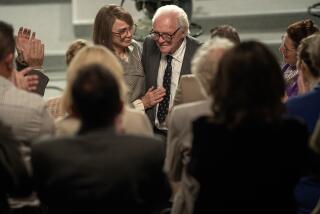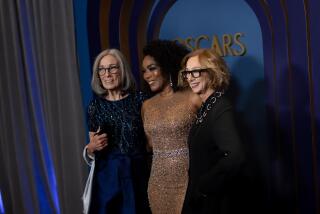‘Jim’ tells tale of executed war reporter, NU grad James Foley
John Foley felt a complicated set of emotions when he viewed the now infamous video of his son, the journalist James Wright Foley, being executed 18 months ago by masked soldiers of Islamic State.
“Despite the world watching, I felt so bad he was alone and none of us were there,” John said in an interview with his wife, Diane, last week. “I only pray that, even though he was physically alone, he died with the memories of all those who loved him.”
A tear then came to John’s eye. “It was horrific,” he said, his voice wavering. “But seeing Jimmy’s lips like that in the video, I could see his courage. I could feel his courage.”
To many Americans, James Foley is a piece of shorthand, a symbol, the orange-jumpsuited man in the grotesque footage that drove home the danger of Islamic State. To the Foleys, he represented something else: Jimmy, a brave and pure-hearted idealist, the son who made them proud, if more than a little anxious, with every new adventure he embarked upon. Foley had been held prisoner for nearly two years before his death, in Syria, at age 40, and his parents had come to embrace their son’s pursuit of the stories beyond the headlines.
The rest of America might start to feel a little more like the Foleys upon watching “Jim.” Directed by Brian Oakes, a film-graphics veteran and the subject’s childhood friend, the documentary is an intimate homage to a deeply likable man — and a reminder that, for all its high-level policy wrangling, the war on terror is just as often about a confused and heartbroken family next door.
After premiering last week at the Sundance Film Festival, where it won a major audience prize, “Jim” will debut on HBO Saturday night. The film paints the native of small-town New Hampshire as a rich human being, one innately driven to take risks in the name of truth.
“I remember as I became more aware of the dangers, asking him, ‘Why are you doing this?’ You have two master’s degrees — why?’ Diane said, sitting near her husband, with a mix of resolute and questioning tones. “And he said, ‘Mom, you have to understand my passion.’ He became more excited just talking about it. And that’s when I began to understand.”
The Marquette University- and Medill-Northwestern University-educated Foley was a free spirit — so caught up was he in the moment he often came hours late to appointments and frequently forgot to pack a toothbrush, the film recalled. Foley took some time in early adulthood figuring out his life purpose. He volunteered with Teach for America; he taught writing to prison inmates in the Chicago area. As the Iraq war progressed, however, Foley felt the need to be closer to, and communicate from, intense global conflicts.
He embedded with the Indiana National Guard as a broadcast journalist, then shortly afterward, he traveled as a freelancer with a small group of international reporter friends to chronicle the 2011 revolution in Libya. Foley was captured there and survived more than 40 days as a hostage before being freed in a negotiated release.
The journalist returned home to his tightknit family — he is the eldest of five siblings and was especially close to his more pragmatic brother Michael, a key voice in the film — but found himself bored with a desk-editing job. He soon returned to a combat zone. In late 2012, he was captured while working in war-torn northern Syria.
The second half of “Jim” is devoted to showing what Foley’s life was like in a harsh prison setting. More than a dozen European journalists were held captive with him at various points; apart from the British nationals, all were released. Their voices here offer a detailed look at life as a Westerner behind Islamic State lines.
There were the board games the prisoners invented out of little raw material. The oranges they coveted like candy. And, of course, the torture sessions. As one former captive says in the movie, it wasn’t the physical pain as much as the psychological uncertainty.
A perennial optimist, Foley was a steady presence throughout. He was frequently helpful and supportive, even if it meant pushing down his own pain.
“The most poignant moment, and the one that drove home Jimmy’s spirit to me watching the film, was when some people weren’t certain about whether they would be released, and Jimmy put his arm around them and supported them even though he knew he would never be released,” said John Foley, a soft-spoken doctor with a New Hampshire accent. “That was the essence of Jim,” he added, beginning to choke up once more.
Oakes, who knew Jim Foley well from their shared New Hampshire town, said, “He was just that guy you always wanted around. Whenever Jim entered that room, he didn’t have to say anything. He just changed the environment.”
If the movie mostly evades the question of whether there was a more traditional way for Foley to be practicing overseas journalism, it also makes clear the benefits that came from his fearlessness. Foley and his colleagues were among the first to transmit horrific images and stories from the region where few dared to travel because it was simply too dangerous. (One of the goals of the foundation that Diane and John formed after their son’s death is to provide a better safety net for the growing number of freelance journalists in conflict areas.)
Hovering above the movie are several what-ifs, particularly with regard to the strict hostage-negotiation policy of the U.S. Though John and Diane Foley decline to speak of it these days, there is a palpable sense of frustration in the film about the government’s efforts. As Foley’s editor notes, the Europeans were all released.
Some viewers might also ask why a civilian was in a hot zone like Syria, especially after cheating death in Libya just a short time before. But this was never a question for Foley, and the film argues it shouldn’t be for us either. As a friend says, in an analogy befitting cinema’s current “Spotlight” moment, you would never question a fireman who rushes into a burning building to do his job. Why would you do the same for a journalist?
For his parents, this is, understandably, a more delicate issue. “It was so hard to have Jimmy home from Libya,” John said. “We didn’t want to push him. But I still feel like sometimes maybe we should have laid more guilt, like that might have stopped him from going back overseas.”
“We could have laid more guilt,” Diane said quietly.
The moment that will emotionally wreck the most steely soul comes in the movie’s conclusion, when Jim’s brother Michael reads a kind of farewell letter written just before Foley was executed. In it, the journalist offers a poignant reminder to each of his close family members of what he loves and remembers about them — the hug he gave one brother outside a comedy club, his wishes to his grandmother.
“You realize you don’t know your children when they become adults,” said Diane, taking a deep breath as she recounted some of the textured details in “Jim.” “They go off and have their jobs and their friends, and a lot of that is a mystery to parents.”
“We came to know Jimmy from the film,” said John.
More to Read
Start your day right
Sign up for Essential California for news, features and recommendations from the L.A. Times and beyond in your inbox six days a week.
You may occasionally receive promotional content from the Los Angeles Times.







